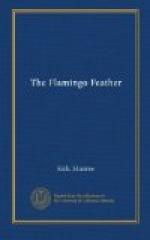While they were doing this, he, with Has-se and E-chee, busied themselves with the canoes of the Seminoles, of which E-chee showed the hiding-place. In these they drove great holes, so that they would not float; or if they happened to lie in the water they cut them adrift, and pushed them far from the shore.
Just as they came to the end of their task, and had thus rendered useless the last of the fleet, a wild yell of disappointed rage close at hand warned them that their enemies were upon them, and that only the most instant and speedy flight could save them from their hands.
The Seminoles had uttered their yell of disappointed rage at seeing, by the moonlight, the flashing paddles of those canoes that had already departed; for they did not at first discover the three who had lingered to destroy or render useless the canoes of their own fleet. As these sprang into the only one they had left uninjured, and shot out from the shore, the Seminoles uttered loud cries of exultation, and rushed to the hiding-place of their fleet, in order that they might follow and capture these three who were now so widely separated from their fellows.
When they discovered what had been done to their canoes, and that they were indeed useless, their fury knew no bounds, and they sent flight after flight of arrows whizzing after those who had thus outwitted them. Many of these struck the canoe; but all, save one, fell as harmless to its occupants as so many drops of rain.
The one barbed shaft that sped so truly on its fatal mission was delivered with all the strength of venomous hate, just as the canoe was passing out of the lagoon, and beyond bow-shot. It struck the gentle Has-se between the shoulders, and, piercing his body, protruded its keen point from his breast. With a sharp cry the poor lad dropped his paddle, and sank into the bottom of the boat.
At this moment the others dared not stop; but, with hearts torn with anguish at seeing their best and bravest thus stricken, they paddled on, until they had rejoined their party and passed beyond the reach of Seminole pursuit.
A few hours later, on a grassy point that projected into the river, which was flecked by glints of the sunlight the lad had loved so well, and which sifted down upon him through the moss-draped branches of a venerable oak, Has-se (the Sunbeam) lay dying. Beside him, and holding one of his hands, sat Rene de Veaux, so numbed by this great and sudden sorrow that even the comfort of tears was denied him, and his eyes were dry and strained.
“Oh Has-se, Has-se!” he cried. “To think that it is for me that thy life is given, and that for my sake only thou art lying here thus stricken to thy death!”
“Grieve not so sorely, Ta-lah-lo-ko, my brother. A brave warrior fears not death in any form; and when it comes to him while he is truly performing his duty, it is to be hailed with joy for the honor it confers.”




